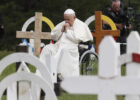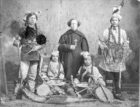The first step of Pope Francis’ “penitential pilgrimage” to Canada involved him returning two pairs of children’s moccasins.


The first step of Pope Francis’ “penitential pilgrimage” to Canada involved him returning two pairs of children’s moccasins.

Canada’s leading Catholic prelate has voiced hope Pope Francis’ visit to the country this week will strengthen efforts at reconciliation with Indigenous communities, and help “turn a page” in order to move forward together.

After a flight of more than 10 hours from Rome, Pope Francis landed in Edmonton and met briefly at the airport with Indigenous leaders, Canada’s governor general and prime minister before heading to the local seminary for a rest.

Pope Francis’ July trip to Canada was born out of his meetings with the nations’ Indigenous people and was planned around encounters with them, and if the pontiff’s words “have value elsewhere,” like throughout the Americas, all the better, said the director of the Vatican press office.

When Pope Francis travels to Canada to apologize to Indigenous communities for the way the Catholic Church joined efforts to uproot them from their traditional culture and spirituality, their traditions will be on full display.

Asking for prayers ahead of his visit to Canada July 24-29, Pope Francis described the trip as a “penitential pilgrimage” as part of a commitment to healing and reconciliation with the country’s Indigenous people.

When Pope Francis visits Canada July 24-29, Oneida First Nation activist Daisee Francour and her colleagues at the U.S.-based international Indigenous nongovernmental organization Cultural Survival will be paying close attention.

Archbishop Bernard A. Hebda of St. Paul and Minneapolis acknowledged with sadness and an apology a federal report released May 11 about abuses of Native American children in government-supported boarding schools — some run by the Catholic Church, including in Minnesota.

Expressing “sorrow and shame” for the complicity of Catholics in abusing Indigenous children in Canada and helping in the attempt to erase their culture, Pope Francis pledged to address the issue more fully when he visits Canada.

Members of Canada’s Assembly of First Nations gave Pope Francis a “cradleboard,” a traditional baby carrier, and asked him to keep it overnight as he reflected on what happened to Indigenous children who were sent to residential schools and, particularly, to those who never made it home again.